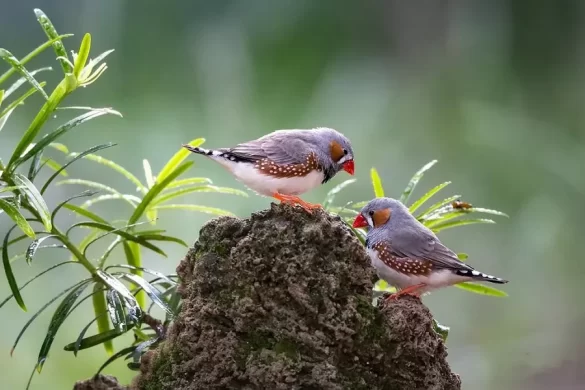Zebra finches, with their charming appearance and lively personalities, have become beloved pets and companions for bird enthusiasts. To ensure the well-being and happiness of these delightful birds, it is crucial to provide them with a well-equipped cage environment that meets their specific needs. In this article, we explore the fundamental elements necessary to create a nurturing and stimulating habitat for zebra finches.
Sufficient Space:
Zebra finches are active and social birds, requiring adequate space to move, exercise, and engage in natural behaviors. The minimum recommended cage size for a pair of zebra finches is 24 inches (60 cm) in length, 12 inches (30 cm) in width, and 18 inches (45 cm) in height. A larger enclosure will provide more room for flying, hopping, and exploring, promoting their physical and mental well-being.
Bar Spacing and Cage Design:
The spacing between the bars of the cage should be narrow enough to prevent zebra finches from escaping or getting their heads stuck. Ideally, the spacing should not exceed 0.4 inches (1 cm). The cage should be constructed with safe, non-toxic materials and designed to ensure security and stability. Avoid cages with sharp edges or loose parts that may pose a risk to the birds.
Perches and Branches:
Zebra finches spend a significant amount of time perched, and providing a variety of perches is essential for their foot health and overall comfort. Include natural wooden perches of varying thicknesses to mimic the texture and diameter of tree branches. These perches should be positioned at different heights to encourage movement and provide opportunities for exercise and natural behaviors like climbing and balancing.
Nesting Area:
Zebra finches have a strong instinct for nesting, even if they are not intended for breeding. Offering a suitable nesting area or nest box within the cage allows them to engage in natural behaviors and feel secure in their environment. Provide a small, enclosed space or a specially designed nest box with nesting material such as shredded paper or coconut fibers. This allows the birds to exhibit their natural nesting instincts.
Food and Water Stations:
Zebra finches require a balanced diet and access to fresh water at all times. Provide feeders that are easily accessible and easy to clean. A high-quality finch seed mix, specifically formulated for zebra finches, should serve as the primary source of nutrition. Additionally, offer fresh fruits, vegetables, and leafy greens as supplementary treats and dietary enrichment. Clean and refill water dispensers daily to ensure a constant supply of fresh water.
Enrichment and Toys:
To prevent boredom and promote mental stimulation, zebra finches need a range of toys and enrichment activities in their cage. These can include swings, bells, mirrors, and interactive toys that encourage foraging behaviors. Rotate and introduce new toys regularly to keep the birds engaged and prevent habituation. Providing different textures and materials for the birds to explore will enhance their cognitive and physical abilities.
Cleanliness and Hygiene:
Maintaining a clean and hygienic cage environment is crucial for the health and well-being of zebra finches. Regularly clean the cage, removing droppings, uneaten food, and debris. Replace soiled bedding or substrate regularly and ensure proper ventilation to maintain optimal air quality. Regular hygiene practices contribute to the prevention of diseases and promote the overall health of the birds.
Conclusion:
By understanding and fulfilling the essential needs of zebra finches in their cage, we can provide them with a nurturing and stimulating environment that supports their physical and mental well-being. Offering sufficient space, appropriate perches, nesting areas, a balanced diet, enrichment activities, and maintaining cleanliness are key factors in ensuring the happiness and longevity of these delightful birds. A carefully curated cage setup will allow zebra finches to thrive, exhibit their natural behaviors, and bring joy to their human companions for years to come.


 Facebook
Facebook  Instagram
Instagram  Youtube
Youtube 